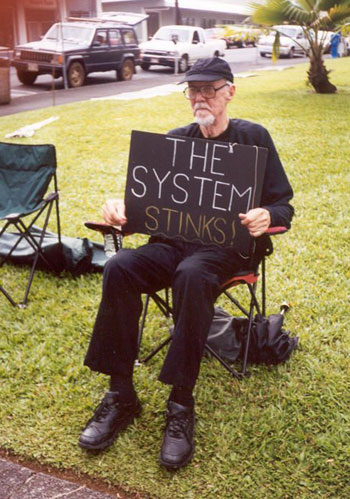
Robert Aitken Roshi, a lifelong political activist, was one of the grandfathers of American Zen and the founding teacher of Three Treasures Sangha in Seattle. Aitken died on August 5, 2010 in Honolulu at the age of 93.

Three Treasures Sangha Remembers Robert Aitken Roshi
Robert Aitken was one of the great forbearers of American Zen and the author of more than a dozen books of essays and poetry. Among these are Taking the Path of Zen; Encouraging Words: Zen Buddhist Teachings for Western Students; and Zen Master Raven. He was the beloved founding teacher of Three Treasures Sangha in Seattle.
Aitken Roshi died on August 5, 2010 in Honolulu at the age of 93. A scholar and a political activist, Aitken founded the Diamond Sangha as a lay community in Hawaii in 1959 with his wife Anne Aitken. The Diamond Sangha has grown into an international network of a lay practitioners and Zen centers in the U.S., Argentina, Australia, and New Zealand.
Aitken Roshi first came to the Pacific Northwest in 1978 to protest the Trident nuclear submarine base in Bangor, Washington. That year he also helped found the Buddhist Peace Fellowship, an organization which advocates for conflict resolution around the world.
While Aitken was in Seattle, a group of activists and Catholic Workers who had been exploring a Zen sitting practice approached him about leading a sesshin (traditional seven-day retreat) and he agreed. Since the Catholic Workers devoted themselves to service without remuneration, they had no money to pay for sesshin basics and ended up sitting on zafus they’d stuffed with the innards of teddy bears from the Goodwill. It was the first of many visits Roshi made to the Northwest over the years.
Three Treasures Sangha grew out of that initial encounter and was officially established in 1985. Jack Duffy Roshi, a student of Aitken’s since 1981, received Dharma transmission from him in 1997. He is now the guiding teacher of Three Treasures and Zen Center Spokane, as well as co-teacher of the Mountain Lamp Community near Bellingham, Washington.
Members of Three Treasures gathered recently to remember and honor their revered teacher and to tell stories. Aitken Roshi was a character, a tall, lanky man with an academic air and a prankish smile. As a teacher he was both exacting and encouraging. Students attending a sesshin led by Aitken expected to strictly adhere to the form of Zen while never knowing what to expect in the dokusan (private interview) room.
Like many storied Zen masters, Aitken’s teaching methods relied on humor as much as seriousness. One student remembered being in dokusan with Roshi, where nothing much seemed to be happening. All of a sudden Roshi stretched out his hands and his student wondered whether this was some new presentation of the dharma. The student asked Aitken what he should do and Aitken replied, “Help me up, I need to stretch my legs.” Another student remembered that Aitken’s glasses were always dirty and clouded with a greasy film, but how warm and supportive the eyes behind the glasses were.
Some of the members of Three Treasures practiced at the Maui Zendo where Aitken taught for many years with his wife Anne, back in the counter-culture days of the 1960s and 70s. One student remembered the Zendo resembling more of a hippie commune than a Zen center. One morning, he recalled, Robert and Anne Aitken woke up Nelson Foster (later Aitken’s Dharma heir and now teacher at Ring of Bone Zendo in California) with great excitement to report that “another adult is coming to live here!”
Aitken was widely respected in the larger Zen community in America as a mediator, adept at resolving disputes. A longtime Three Treasures member recalled another memorable experience with Roshi. He was attending a Buddhist conference in Michigan where an increasingly heated discussion was underway about whether a lay Buddhist practice, rather than the monastic path, could flourish in America. Roshi just got up and said “We’ll know in a hundred years.” It was a turning word for all of the participants at the gathering. And Aitken was right: we’re still exploring the viability of lay practice today.
Robert Aitken began his own Zen practice in a prisoner-of-war camp in Japan in 1944, where he met R.H. Blyth, the English literary scholar whose popular collections of haiku translations served to introduce Buddhism to the West. Aitken would follow a similar scholarly and literary approach to studying, practicing, and teaching Zen. When he returned to the States, he founded the small Zen community in Hawaii that eventually blossomed into the Diamond Sangha.
Three Treasures is one of many Diamond Sangha groups around the world lucky enough to have had Aitken Roshi as a teacher. His life was truly a model for applying what one learned on the cushion to living a socially engaged life in the world. He was a lifelong peace activist, protesting outside of a military base in Honolulu week after week, holding a stick with a skull on it. After retirement he could be seen in downtown Hilo every Saturday with a chalkboard—blank on one side and on the other side he’d written: “The System Stinks.” His fervor for social justice was more than matched by his compassion and dedication to his students. He gave his all so that all of us could attend to the welfare of all beings.
For more information about Three Treasures Sangha and its zendo in Seattle’s historic Central District, please visit www.three-treasures-sangha.org for address, schedule, and events. Or call Larry Keil at 206-322-8759 to arrange an orientation.
Information about Mountain Lamp Community, as well as Jack Duffy Roshi’s recent talks about Robert Aitken, can be found at www.mountainlamp.org.
Contributors: Candace Davis, Kathryn Hunt, Larry Keil, Emily Warn.
Photo: Courtesy of Three Treasures Sangha.